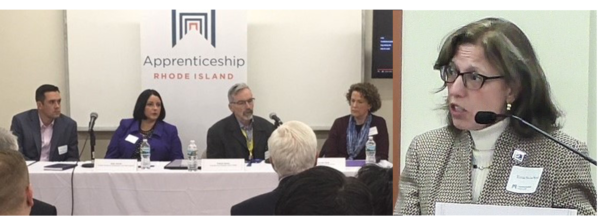Healthcare leaders tout “Competitive Advantage” of Apprenticeship
Posted on December 1, 2017 by admin - No Comments

Participants from Executive Leadership, Management & Labor share best practices
Providence, RI.
In recognition of the State of Rhode Island’s 2nd annual participation in National Apprenticeship Week, Apprenticeship Rhode Island, a program initiative of Building Futures, hosted a gathering of over 90 participants to learn about the progress Rhode Island’s Healthcare sector has made in building critical infrastructure to meet the workforce needs of the industry in the coming decade.
National Apprenticeship Week (NAW) is a celebration, initiated by the US department of labor that offers leaders in business, labor, education, and other critical partners a chance to express their support for Apprenticeship. NAW also gives apprenticeship sponsors the opportunity to showcase their programs, facilities and apprentices in their community. The weekly events highlight the benefits of Apprenticeship in preparing a highly-skilled workforce to meet the talent needs of employers across diverse industries.
A number of federal, state and local officials as well as leaders from private industry participated in Apprenticeship Rhode Island’s special healthcare forum which took place on November 9th, and was the headline event among fifteen different events in Rhode Island’s celebration of NAW. Panelists of the forum included Jody Jencks, Director of Workforce Development for Care New England; Jennifer Hyde, Senior Administrator for University Medicine; Rick LaFerriere, Lead Manager-Workforce Initiatives at CVS Health; Nicole Hebert, Director of Operations at the RI Parent Information Network (RIPIN) and Patrick Quinn, Executive V.P. of SEIU 1199 NE.
Jill Houser, Regional Director of Apprenticeship for Region 1 of the US Department of Labor was on hand to welcome assembled guests and noted that she was impressed by the Forum’s gathering. When thanking Building Futures’ Executive Director-Andrew Cortes-for his organization’s work in building non-trade Apprenticeships, Houser offered that; “Andrew and I have something in common. In addition to our passion for apprenticeship, we were both carpenters. And carpenters like to build things. And if there’s one thing you learn as a first year apprentice, it’s that there’s more than one way to build a structure that will last for hundreds of years, and I really feel like we’re in that place.”
The forum’s moderator, former Senate President and now President of the Rhode Island Hospital Association echoed Ms. Houser’s remarks by recognizing that “It is so cool to come from the general assembly and see words on a paper, ideas, discussions, and in just in two years’ time, become a reality.” During her time in the RI Senate, Paiva Weed was a champion of improving workforce development resources for RI and a supporter of the expansion of the Apprentice model to non-trade occupations.
Many of the employers furthered awareness of how they are working to integrate the apprenticeship model into their work places. “Although the apprenticeship language was new to healthcare, it really wasn’t. It already existed in residencies and fellowship programs, and now how can we make it applicable to other career pathways?” Said Jody Jencks, Director of Workforce Development for Care New England. Jencks continued; “The care model has changed over the last 2o years, so the apprenticeship framework has provided us a model, really a roadmap, to look at how to align the care model to the competencies and skills of our workers.”
For example, Jencks continued, “Our nurse leaders spearhead the program [at Women and Infants], bringing in novice to advanced beginner nurses that either had no experience or only a few years in the field: being able to apprentice this program, to give them the opportunity to build up these competencies and skills, really allows for a seamless transition into our workforce.”
Patrick Quinn, Executive V.P. for SEIU 1199-NE, worked hand in hand with Care New England and Apprenticeship Rhode Island on apprenticing medical coders. Quinn noted that “There’s always a lot of training going on in the healthcare world because practices and technologies change so quickly, so I think what Apprenticeship has to offer is quantifiable, affordable, and is both skills and knowledge based, and that’s where healthcare is moving towards.’
Panelist Rick LaFerriere, Lead Manager Workforce Initiatives at CVS Health added, “At the end of the day, you look at this and say, ‘Well, this is a pretty great workforce program. Why wouldn’t we do this?’ So let’s get to work on this.”
LaFerriere continued, “For us, what an amazing competitive advantage this gives us: to work with Apprenticeship RI, to have a pre-apprenticeship program that we can customize for these roles. Right now, we are working on a retail pharmacy tech pre-apprenticeship program, but we’re looking to do more. And I am so grateful to our friends at Apprenticeship Rhode Island. “
“Apprenticeship works with all shapes and sizes of employers, whether you’re a small single employer or a group of employers, or, a model that many people know, a group of employers that work with labor unions.” Said Andrew Cortés, Executive Director of executive director of Building Futures-home to Apprenticeship RI… “Apprenticeship in the healthcare sector makes sense…. “University Medicine is a great example, using apprenticeship to upskill medical assistants to become licensed practical nurses through an innovative partnership with us and the Community College of RI. Standardizing the skill levels of these critically important caregivers ensures that everyone wins” Cortés added.
Jennifer Hyde, Senior administrator for University Medicine perhaps best summed up the panel’s sentiments when she concluded, “We didn’t choose apprenticeship, apprenticeship chose us.–and it’s been a wonderful collaboration.”
Apprenticeship RI is an initiative of Building Futures/RI and is funded in part, through an American Apprenticeship Initiative grant from the U.S. Dept. of Labor. Assistance is available to all RI employers (outside of the building trades) at NO COST, in designing, implementing and registering new apprenticeship programs. In partnership with the RI Department of Labor and Training, Apprenticeship Rhode Island is working with employers, industry associations, and educational partners to address employers’ workforce development needs.

